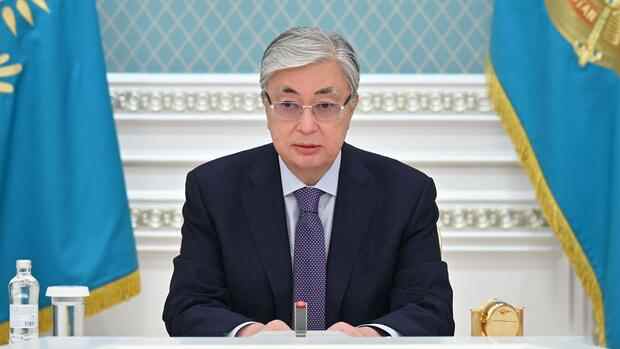In response to the protests, the current President Tokayev dismissed the entire government and imposed a nationwide state of emergency.
(Photo: imago images / Xinhua)
Nur-Sultan After several days of violent protests, the Kazakh leadership claims to have regained control of the situation in the country. The constitutional order has largely been restored, said President Kassym-Jomart Tokayev, as his office announced on Friday.
The Interior Ministry announced that 26 “armed criminals” had been “liquidated” and more than 3,000 had been arrested. 18 police officers and national guardsmen were killed on the part of the security forces. State television announced that Tokayev would make a speech to the nation that day.
After serious riots, concerns about a further escalation are growing internationally. “A quick calming down of the situation is essential in order to avert further bloodshed, a destabilization of the country and thus also damage to the economic and investment location Kazakhstan,” said the Eastern Committee of German Business. Kazakhstan is “by far the most important German trading partner in Central Asia”.
The Foreign Office reported that they were exchanging ideas with closest local partners about developments in Kazakhstan. The task now is to find a peaceful solution “within the framework of a comprehensive dialogue with all those involved”.
Top jobs of the day
Find the best jobs now and
be notified by email.
The violence, but also the massive restrictions on access to the Internet and social media, are viewed with concern. Kazakhstan’s obligations under the OSCE to uphold fundamental freedoms also included maintaining free access to information, freedom of the press and freedom of assembly.
The organization Reporters Without Borders lamented reports of police violence against media representatives in the authoritarian country that borders Russia and China. In addition, the Internet was repeatedly blocked in the ex-Soviet republic with its 18 million inhabitants. “That makes it difficult to provide independent information about what is going on.”
Kazakhstan has been experiencing unprecedented protests for days – especially in the metropolis of Almaty in the southeast.
(Photo: dpa)
The USA also spoke out again for a peaceful solution to the crisis that had been triggered days ago by the sharp rise in gas prices. US Secretary of State Antony Blinken phoned his Kazakh colleague Muchtar Tleuberdi on Thursday evening. Blinken had reaffirmed “the United States’ full support for the constitutional institutions of Kazakhstan and the freedom of the media,” the State Department in Washington said later. There were also warnings from the EU that the violence must come to an end.
Russia sends troops
A Russian-led military alliance has meanwhile sent its first soldiers to the ex-Soviet republic at the request of Kassym-Jomart Tokayev. According to the organization of the collective security treaty, among other things, Russian paratroopers were deployed as part of a “peacekeeping force”. In addition to Russia and Kazakhstan, the alliance also includes Armenia, Belarus, Kyrgyzstan and Tajikistan. These states had also sent armed forces, it was said.
Overview of the German-Kazakh economic relations
Kazakhstan has been experiencing unprecedented protests for days – especially in the metropolis of Almaty in the southeast. It is feared that there could also have been many civilian casualties.
The unrest in the ex-Soviet republic, which is rich in oil and gas, was triggered by displeasure at the rise in fuel prices at petrol stations. But they quickly turned into sometimes violent protests against the government.
Kazakhstan was ruled for decades by the authoritarian ruler Nursultan Nazarbayev, who retained great influence even after his resignation in 2019. In response to the protests, the current President Tokayev dismissed the entire government and imposed a nationwide state of emergency.
More: What the unrest in Kazakhstan means for Russia, China and the USA
